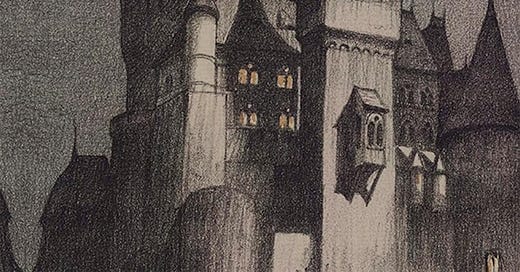Dracula 24
Study Guide Questions for Ch. 24 “Dr. Seward’s Phonograph Diary, Spoken by Van Helsing”
If you are looking for the beginning of the study of Bram Stoker’s Dracula then you can go HERE for a brief introduction. At the bottom of the introduction you will find the links to each section of the study guide as it becomes available. If you would like to see the growing list of available book studies available for free on this site you can go HERE. Enjoy!
Virtues/Vices/Great Ideas: (Find them in the Text)
Faith, Hope, Prudence, Doubt, Fortitude, Love
Grammar Questions: (The Information of the Text)
What did Van Helsing tell Jonathan Harker was his “most holiest office?”
After Quincey paid the dock workers for the information, what did the group find out about what Dracula had been up to?
What kept the Czarina Catherine from sailing when it was originally expected to do so?
What is the group’s plan to try to intercept Dracula?
What did Van Helsing say as to why it was “necessary – necessary – necessary!” to pursue Dracula even though he had fled from England?
According to Van Helsing, why must their work against Dracula “be in silence, and [their] efforts all in secret?”
What did Dr. Seward take note of concerning Mrs. Harker’s condition and the dangers it may pose to the group?
What piece of equipment did Quincey Morris propose should be added to the resources carried by the group hunting Dracula?
What did Mina request that the men should no longer do concerning herself?
What reasons did Mina state for why she should be taken along in pursuit of Dracula?
Logic Questions: (Interpreting, Comparing/Contrasting, Reasoning)
In what way was Jonathan calling Dracula’s “last resource” an “earthwork” a “double entente?” What did he mean by that?
What did Jonathan mean by saying, “Now that his horrible danger is not face to face with us, it seems almost impossible to believe in it?” Why would that be?
Why might Dracula have been wearing “a hat of straw?”
When describing the Captain of the Czarina Catherine’s conversation with Dracula, what did Van Helsing mean by saying, “-with blood-” or “-of blood-?”
Why did Van Helsing think the simile of calling Dracula like a tiger was so fitting?
Van Helsing stated, “Our toil must be in silence, and our efforts all in secret. For in this enlightened age, when men believe not even what they see, the doubting of wise men would be his greatest strength.” How would other men’s doubt be an aid to Dracula?
Why was Mina unable to freely share her thoughts with the group?
Why did Dracula leave England for Varna the way he did if it is so much faster to travel upon land for most of the way than by boat?
What did Van Helsing mean when he said, “I do but say what we may do – what we must do. But, indeed, indeed we cannot say what we shall do?”
Rhetoric Questions: (The Analysis of Ideas in the Text)
Dr. Seward said that no matter what men go through that human nature is such that, “we fly back to first principles of hope and enjoyment” once the trouble has been removed. Do you agree that mankind has optimism as its default position and that we return to it by nature when not currently suffering? Why or why not?
Harkening back to Van Helsing’s claim that “in this enlightened age, when men believe not even what they see, the doubting of wise men would be his greatest strength,” what is ironic about men of the “enlightened age” not being willing to believe what they see with their own eyes? What would be an example of this in our own day and in the real world?
Van Helsing considered the work they were doing to be “for the good of mankind, and for the honour and glory of God.” How does working for the benefit of others and the glory of God differ from working for one’s own self interest? What kinds of things would a person do or not do who is only working on behalf of their own interests? What kinds of things would a person do or not do who is only working for the good of others and to bring glory to God? Is a person’s own life qualitatively better or worse when they look to their own needs and wants first and foremost?
Theological Analysis: (Sola Scriptura)
Read Luke 16:19-31. How might we relate what Moses tells the rich man to Van Helsing’s comment about the “enlightened age” they were living in?
Read Philippians 2:1-11. How does this passage shape and focus the Christian work ethic? How can we relate back to our present reading?



